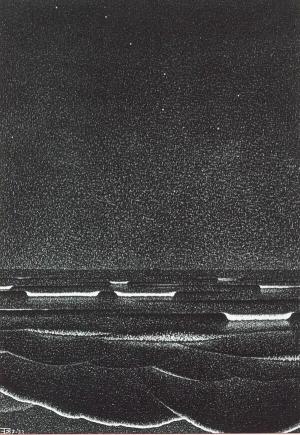|

Forms in Space
Kurt Schwitters
1920
_______________________
What We Remembered Before
Amish Trivedi
from "FuturePanic"
presented by Jerome Rothenberg
(....)
As a memory
just as it was done before
clearings came. Another sensation that
comes in when otherness vacates. A descent
and catching the hands in an escape
pose, bringing brickarms
to spin into another form so
brilliant the eyes retract into
their holster. Rearranged
to form new compounds
built on the generations
of freedom we
rebelled from,
the glass lip tasted
but prevented from
blistering under a
skin we've already
known. The next
year is always easier
than this one but I
realize I'm expected
to speak in projections
that never seem
to clear the teeth
utterly.
...(more)
_______________________

House in Normandy
1939
Martin Bloch
d. June 19, 1954
_______________________
The Struggle Against Language
Scott Esposito
quarterly conversation
Respected, parodied, revered, despised, Karl Ove Knausgaard’s My Struggle has been with us for just four years. Few in the English-speaking world knew the Norwegian’s name in 2012, but in just four years he has come to seem so omnipresent that NYRB critic, author, and beloved contrarian Tim Parks recently chastised us against “the impression of [Knausgaard's] huge and inevitable success.”
There is some truth there. He has not sold in numbers that would put envy on J.K. Rowling’s face—there is a degree of hype—but with U.S. sales of the first four volumes of the series likely topping 200,000 copies, Knausgaard is certainly far more successful and better-known than all but a handful of authors of the last few years. And now that we have Book 5 the end is in sight; the method behind the entire cycle has at last come into view. It is time to take stock.
(....)
A major achievement of Book 5 is to make us feel the struggle against incessant failure that characterizes the life of all writers, a struggle that is most acute at the beginning of the writing life. This is where Knausgard’s capacity for humiliation, his inherent faculty with masochism, his very willful maximalism gives his account a texture that distinguishes it from other accounts of the young writer. The sheer weight of Karl Ove’s failures is monumental, but somehow it does not deaden the momentum of the narrative. Knausgaard transforms this incredible doubt into the site of his struggle to find a language; he wants to understand why he continues to write in spite of everything. At times the story takes us through relationships and occurrences that at first blush seem like sideshows to this tale. But they are not pointless digressions. Karl Ove is maturing, he is working through the issues that have held him back, even as he is seeding the preoccupations that will become the irresolvable dilemmas of his mature decades.
...(more)
_______________________

Aphorism
1923
Kurt Schwitters
b. June 20, 1887
_______________________
Between
Ágnes Nemes Nagy
Translated from the Hungarian by Hugh Maxton
(from Napforduló, 1967)
presented by flowerville
(....)
Between the day and the night.
Aches and stabbings,
visions, voiceless aqueducts,
inarticulate risings,
unbearable tension
of verticals between up and down.
Climates. Conditions.
Between. Stone. Tanktraces.
A strip of black reed rimming the plain
written in two lines, in the lake, the sky,
two black plaques of signsystem,
diacritic on the stars —
...(more)

Phosphorescent Sea
M. C. Escher
b. Jun 17, 1898
_______________________

Bill Berkson
1939–2016
_______________________
In Bill's Backyard, Bolinas
Tom Clark
Now light streams through the trees of the dream.
Dead friends amble through the green bower
The windsilvered eucalyptus makes over our heads;
In Bill's backyard -- framed for this flashback
To the days before, or sometimes during, the flood --
Things are, as in a kind of moonlit masque magically
Lit from within, awhirl, the carousel scene
From Strangers on a Train, though here strangers
There are none, only friends; summer fog coming in
On a grand soft dragon boat, to drift
Over the strangely busy, populous village in the dream;
...(more)
_______________________

M. C. Escher
_______________________
Asynchronous! On the Sublime Administration of the Everyday
Mike Pepi
... something funny happened on the way out of R&D. Asynchronous processing hasn’t simply left the lab and entered our devices and networks. Instead, the asynchronous principle—that complex systems should be designed to allow tasks to run independently as resources become dynamically available—has moved outwards from the chip to the server, from the server to the data center, from the data center to the workplace, and from the workplace to the city. Asynchronous processing has emerged as a new ideal, and it is increasingly being applied in fields as diverse as software design, biomedical engineering, and labor-force management.
No discussion of the contemporary can ignore the present drive to process more and more of society’s moving parts in the fashion of an asynchronous bucket brigade. If today’s lifeworld distinguishes itself by the ubiquity of computing in all its various forms, then the expansion of the asynchronous principle represents a fundamental shift. This expansion requires not just the datafication of everyday life, but a significant reformation of the social relations that grew around the modes of exchange proper to the pre-asynchronous era—what we might call linear information capitalism. With the introduction of asynchrony, these relations appear as so many bonds to be burst when the buckets begin arriving from everywhere, heralding the addition of a spatial dimension to what had, until now, been simply temporal sequences. As with all such arrivals, the asynchronous is initially apprehended in terms of the previous era, and so its borders remain frustratingly concealed behind inherited ideas about the individual’s relationship to their labor, the market, and the state. How can we begin to uncover the contours of the new asynchronous present?
(....)
We have dreamed about the revolutionary potential of self-organization for generations, but the apparent harmony between asynchrony and anarcho-syndicalism, libertarianism, or horizontalism obscures the extent to which an engineer’s fantasy has become management’s best friend. The decentralization achieved by asynchrony is different from the political ideal of decentralization. From the perspective of the individual worker, asynchrony doesn’t remove authority as much as displace it. A non-blocking schema allows orders to pour in from everywhere, but they’re still orders. The absence of a linear sequence means paying labor for only the time it works, and not a second longer; work need not be synchronized with the arbitrary designations of work days, licenses, or any other ordinal mechanism that produces artificial scarcity. You can work anytime you want, but there’s no wage if you’re at rest. And when you’re at rest, demand will still be processed, perhaps by another worker who is faster and less expensive. The result: lower labor costs and higher profit. Nor is asynchrony simply flat. It is very interested in hierarchy—let the fast move faster and the slow drag down only themselves.
The new asynchronous regime optimizes coordination at the expense of that which is coordinated. Any newfound autonomy applies only to the system itself. This is why, although asynchrony has established itself at the level of infrastructure, its most substantive expressions will be political. A critical history of the aspiration to asynchrony is necessary to separate utopian visions from a real politics that accounts for the new socio-technical capacities the asynchronous.
...(more)
e-flux journal issue 74: “Art Ontologies of Silicon Valley”
with Douglas Coupland, Ingrid Burrington, Andrew Norman Wilson, Mike Pepi, Lee MacKinnon, Elvia Wilk, Alexander Galloway, Zach Blas, and Marina Simakova
_______________________

photo - mw
_______________________
Technologies of Voluntary Servitude (TovS):
a post--Foucauldian Perspective on Social Media
Alberto Romele, Camilla Emmenegger, Francesco Gallino, and Daniele Gorgone
academia.edu
Abstract:
This paper aims to offer a new theoretical framework for thinking surveillance and submission in social media. Two attitudes have been dominant in this context until now. In the first wave of Internet studies, academicians used to consider virtual environments as “technologies of emancipation”. With the birth of the social web, scholars started to treat social media as “technologies of surveillance”. Surveillance and Panopticism found breeding ground in Internet and social media studies. Our hypothesis is that this perspective, although interesting and valuable, is today unsatisfactory, because it fails to give an account of what we consider as evidence: despite an increasing critical literature, and despite the fact that people are more and more aware of the surveillance exercised by social media, not much seems to be changing in prosumer’s (producers and consumers) practices. Our thesis is that this happens because individuals are not forced or cheated by the sociotechnical system, but rather they voluntarily submitted to it. In the first section, we are going to introduce La Boétie’s notion of “voluntary servitude”. According to a minimal definition, four aspects characterize voluntary servitude: (1) disadvantageousness – submission is a form of uncertainty because it depends upon power's arbitrariness; (2) abstainability – if the serfs choose submission, than freedom is just a matter of abstention; (3) (collective) subalternity – servitude presupposes a condition of submission to a form of power, a submission that singles out a collective dimension; (4) awareness – the submission cannot be reduced to a form of deceit of the power or to a miscalculation of the subjugated. In the second section, considering the paradigmatic case of Facebook, we are going to make the notion of voluntary servitude operative in the context of social media.
_______________________

Castrovalva
M. C. Escher
1930
|








